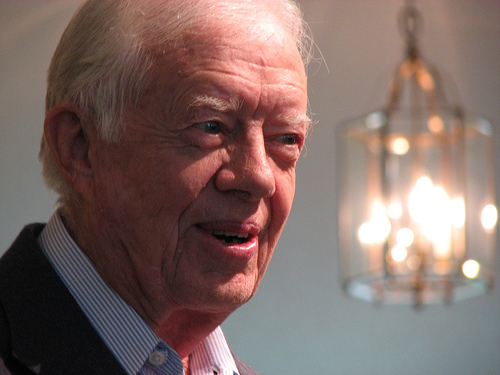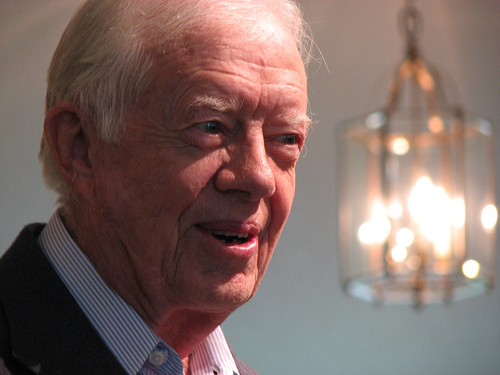 Amid a volatile energy market and a lack of green job investments in the future, the divided Appalachian coalfields have reached a state of emergency this summer. And yet, the Obama administration remains entrenched in a regulatory state of denial.
Amid a volatile energy market and a lack of green job investments in the future, the divided Appalachian coalfields have reached a state of emergency this summer. And yet, the Obama administration remains entrenched in a regulatory state of denial.
Never has there been such a moral imperative for the personal intervention of the 2002 Nobel Laureate for Peace, Jimmy Carter.
Never has Carter’s hands-on determination for economic revival and reconciliation between divided communities been more needed in the most polarized part of our country–the devastated coalfields of Appalachia.
If any other country in the world subjected their citizens to a daily blasting of millions of pounds of ammonium nitrate/fuel oil explosives–often within 1,000 feet–raining silica dust and heavy metals on historic settlements, contaminating watersheds and headwaters, blowing mountains and deciduous hardwood forests to bits, and resulting in de facto forced removals of American citizens, the United Nations would be readying to intervene.
If any other federal government made top level decisions on its national energy and coal mining policy without making a SINGLE visit by a top level federal official to its ground zero coalfields, and instead depended on dysfunctional state agencies beholden to outside corporate mining interests to maintain primacy over mining concerns, the rest of the world would roll its eyes at such a mockery of health care and homeland security and participatory democracy.
This is the reality of the Obama administration’s recent decision to “regulate” and not abolish mountaintop removal mining in Appalachia–an acceptance of human rights and environmental violations that would be condemned in any other country.
As the actual president who signed the Surface Mining Control and Reclamation Act into law in 1977 and granted federal sanctioning of mountaintop removal mining, Jimmy Carter should play a unique historical role in stopping the egregious strip mining operations that former Vice President Al Gore has a termed “a crime–and ought to be treated like a crime.”
This is the truth: The negligent state agencies in West Virginia and Kentucky that still hold sway over regulatory decisions, like the well-meaning but Beltway-bound Obama administration in Washington, DC, lack the moral resolve to break the stranglehold of Big Coal in Appalachia.
The refusal by top level officials in the Obama administration to visit a mountaintop removal site in Appalachia reflects either a profound denial of the horrific reality of mountaintop removal mining and a recognition of the ease in which federal environmental regulations can be circumvented, or a policy of disingenuous regulatory banter that disregards the economic and environmental security in the coalfields.
In the end, despite his clean energy and green jobs initiatives for the rest of the country, President Barack Obama’s recent decision to “regulate” and not abolish mountaintop removal operations will trap Appalachia in a 20th century muck of economic development.
And this is where Jimmy Carter must use his moral authority to get Obama to get right with history.
In the spring of 1977, President Carter addressed the American people in a televised speech on his proposed energy policy and his creation of the Department of Energy: “We must look back in history to understand our energy problem.”
On August 3rd, 1977, surrounded in the White House Rose Garden by coalfield residents and environmentalists who had waged a ten-year campaign to abolish strip-mining, President Carter begrudgingly signed the Surface Mining Control and Reclamation Act as an act of political compromise. “In many ways,” he told his guests at the signing, “this has been a disappointing effort.” Calling it a “watered down” bill, Carter added, “I’m not completely satisfied with the legislation. I would prefer to have a stricter strip mining bill.”
“The President’s other main objection to the bill,” wrote the New York Times, “is that it allows the mining companies to cut off the tops of Appalachian mountains to reach entire seams of coal.”
Three decades later, President Carter’s worst fears have been realized. And it has not happened by accident, but the blatant manipulation of federal regulations.
Big Coal has levelled over 500 extraordinary mountains–all of which would have easily been recognized as national monuments in other states and countries–and applied a scorched earth policy to an estimated 1.2 million acres of hardwood forests in our nation’s carbon sink, while jamming over 1,300 miles of headwater streams with mining waste.
This failed mining policy of regulation has not only destroyed our nation’s natural heritage; mountaintop removal has ripped out the roots of the Appalachian culture, and depopulated and left historic mountain communities in poverty and ruin.
According to the Appalachian Regional Commission charts on poverty, some of the highest levels of economically distressed communities in the nation reside in the areas of mountaintop removal.
“I am not here as a public official,” Carter said in his Nobel lecture in 2002, “but as a citizen of a troubled world who finds hope in a growing consensus that the generally accepted goals of society are peace, freedom, human rights, environmental quality, the alleviation of suffering, and the rule of law.”
In the name of peace, human rights, environmental quality, the alleviation of suffering, and the rule of law, coalfield residents desperately need Carter to make a visit to a mountaintop removal site and intervene as a special emissary to bring an end to the crime of mountaintop removal and draw up a roadmap for economic revival through green jobs and clean energy initiatives.
August 3rd, the anniversary of the Surface Mining Act, would be a good day to announce his first visit.




